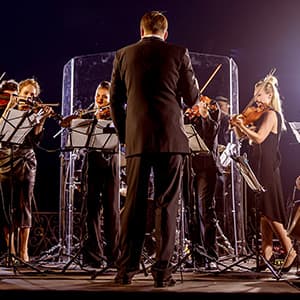

Chamber Music Tickets
Up to 30% Off Compared to Competitors.
Location: Select Location (e.g, New York)
Events Nearby
We're Sorry. There are currently no events near you.
About Chamber Music
Today, chamber music is celebrated in concert halls and festivals around the world, with numerous ensembles dedicated to both classical and contemporary works. Major concert series such as the Chamber Music Society of Lincoln Center and the International Chamber Music Festival showcase top-tier talent and often feature new compositions alongside classic repertoire. The rise of digital platforms has also expanded access to chamber music, with many ensembles livestreaming performances and offering virtual concerts. Events like the 'Chamber Music America' conferences and summer festivals are vital for networking and collaboration among musicians. Additionally, educational initiatives have emerged, encouraging young musicians to explore chamber music through workshops and competitions. Current trends in chamber music include collaborations with other art forms, such as dance and theater, and the incorporation of multimedia elements, making live performances even more engaging. The genre remains a vibrant part of the concert landscape, with an emphasis on both preserving tradition and embracing innovation.
Chamber Music History
Chamber music, often regarded as the 'music of friends', has a rich history that dates back to the late Renaissance and early Baroque periods, around the 16th to 17th centuries. Initially, it was performed in private homes and salons, intended for small audiences, as opposed to larger orchestral works that required concert halls. Composers like Mozart and Haydn were pivotal in the development of this genre, creating intricate pieces designed for small ensembles, typically featuring string instruments, woodwinds, and piano. The Classical period saw chamber music evolve further, with the string quartet becoming a prominent format. The 19th century introduced Romantic composers such as Brahms and Schumann, who infused the genre with emotional depth and complexity. By the 20th century, chamber music continued to innovate, incorporating diverse styles and influences, reflecting broader cultural shifts. The flexibility of chamber music allows for a wide range of instrumentation, from traditional string quartets to modern combinations, making it a dynamic and evolving genre. Its intimate nature fosters a unique connection between musicians and audiences, often leading to a more personal concert experience.
